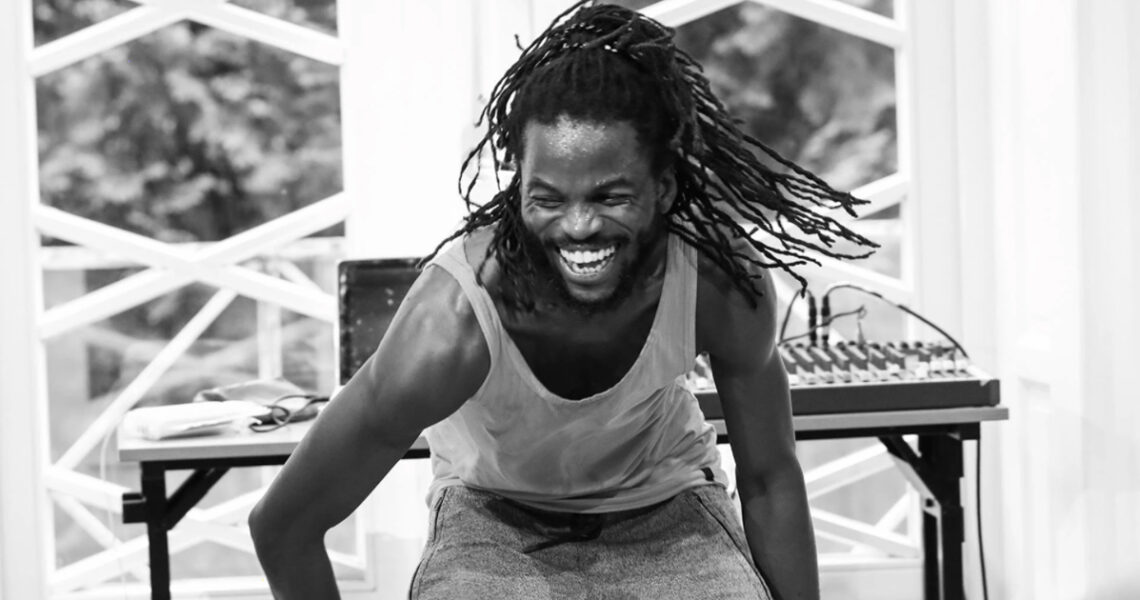
We caught up with Ugandan-born dance artist Antonio Bukhar, course leader for the CertHE Cultural Dance Forms course at NSCD.
Read the interview in full:
I’m a dancer and performing artist from Uganda. I do choreography, I teach, I see myself as an educator. I do community dance projects, and anything I can get my hands on in the area of dance. The styles of dance that I do include breakdance, Hip-hop, dancehall, contemporary, Afro-fusion, and my favourite is always a fusion, where I get a chance to tailor a class or a performance based on who is attending and who is watching.
The feeling of stability, the duration that I’m going to be working with a new dance school, because I’ve been going from project to project, fellowship to fellowship, from one performance to another. It’s a really good opportunity to look wider, based on the timeframe, and see how you can get people from here to there. There are so many opportunities to try different things and see people’s evolution in that time.
I just love the idea that this course gives the opportunity to learn different dance styles. Where dance is going, the more versatile you are the better your chances, especially in this ever-changing popular culture and urban culture. So I’m pretty confident that students will get that wider scope and diverse vision of what dance could be and also versatility in their styles – and that usually translates into more opportunities, from my experience. With me as a course leader, they will definitely gain a certain vibe from the power of Africa, something I can’t put into words – they’ll just have to see!
Seeing VHS tapes from Michael Jackson got me into personal training for several years, that led me into starting a community dance project where we were having peer-to-peer exchanges. That opened into starting a dance company, then being exposed to the national theatre of Uganda, opening doors to the international world with performances and choreography, and then jumping from that from fellowship to fellowship, and now to the School.
Looking at how my extensive community dance background could make an impact and advance knowledge in the institutional or academic world. Looking at humanising pedagogy and how students can be seen as individuals rather than a mass of people. Digging deep into how dance can be beyond form and how we can use this as a tool to touch and impact so many lives and livelihoods.
The highlight of my career so far would be the Pina Bausch Fellowship which I received in 2017, because it introduced me to academia, as the fellowship was at the University of Auckland. Academia being the area that I’m now venturing into as deeply as possible, I was just appreciative of that opportunity but also of obviously the name Pina Bausch – a household name in the dance industry. It led me to a route that I was so willing to go down, but I needed that door opened.
That would definitely be the Caroline Plummer Fellowship in 2019 at the University of Otago, because of the magnitude and the scope of the project. It gave me also an opportunity to be so many things, all combined in one project; a community dance practitioner, a choreographer, a teacher, an administrator, a project manager. It was a very interesting challenge that I enjoyed so much. At the end of the fellowship we had a performance called Ffenna 2019 which had more than fifty people on stage, the youngest being below six and the oldest over sixty. We had less than a month to put the whole thing together but it was magic, and the satisfaction I got from that and the gratitude that the audience and the participants showed – it’s going to take me a while to get something like that again, I think.
I just love the idea of being able to teach different groups and different ages and levels, and my favourite thing is always having one class that has a diversity of people, because I get so much gratitude from seeing the many ways dance can be positively impactful, in a different way for each individual person.
The music that gets me going is mostly dancehall and afrobeats because those are genres that I listen to and dance to at the same time, whereas other kinds of music I usually do one or the other, dance to it and don’t even listen to it. Dancehall and afro really get me in the “vibe” and bring out my Afro-fusion style pretty well.
My kids and my family. I surround myself with loving and caring people that keep me going. I source inspiration from so many spaces – one time I saw a keyboard player at a church and I danced the whole night. If I see people excel in a space where I can use dance as a problem-solving tool, that drives me to keep going. I didn’t have that one person in Uganda when I was starting this as a professional career who I could be like “I want to be like this guy”, so I just want to be a role model for a lot of people who share my story.